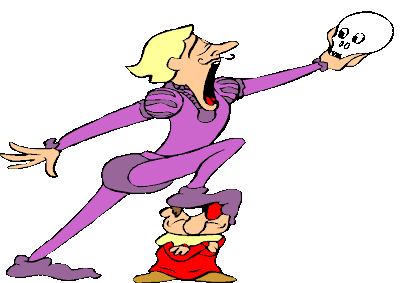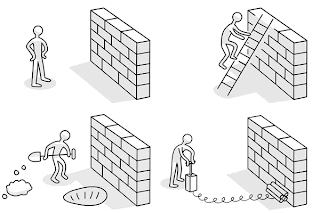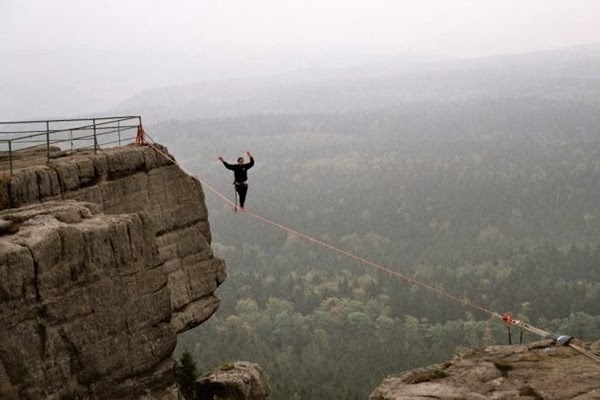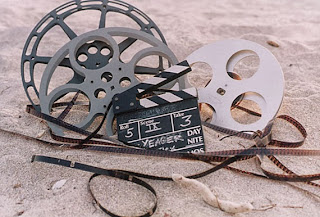 You did it!
Congratulations! After months or years of training, after 5 or 10 or 50
auditions, after getting called-back – twice, after reading for the producers,
reading for the studio or network, after a screen-test, you finally got cast in
your first speaking part in a movie or TV show.
You did it!
Congratulations! After months or years of training, after 5 or 10 or 50
auditions, after getting called-back – twice, after reading for the producers,
reading for the studio or network, after a screen-test, you finally got cast in
your first speaking part in a movie or TV show. What follows are what I consider to be the 4 essential steps you must take, whenever you breakdown a script. This happens before you begin to memorize your lines. And these aren't things you should be thinking about when you are acting. They are PREPARATION. You break down the script, then you learn the dialogue, then when all the prep is done and you have your lines down, you simply react truthfully to the imaginary circumstances in the scene. But first you must create those imaginary circumstances fully...
READ THE SCRIPT FOR INFORMATION
The first time you read
a script you shouldn’t be trying to act it. This is the only time you’re able to read it as an audience. After this first
reading you will always be reading it as an actor. This means reading more
than just your lines. This sounds obvious but many actors start reading a script by focusing
on their own lines and how to say them. Big mistake. Read the whole script to
yourself and learn everything you can about what is going on. Don’t say
anything out loud – not even out loud in your head (think about it) and don’t
try to memorize anything. Actors often miss extremely important information
contained in the descriptive text or other characters dialogue because they
focused on their own lines too soon. Read it for the STORY. Then, when you've finished...
Read it again. And then, depending on how big your role is...
Read it third a time. Now you're ready to ask:
Read it again. And then, depending on how big your role is...
Read it third a time. Now you're ready to ask:
No, not those questions. Before you begin to
start learning your dialogue, ask yourself (and ANSWER) these four questions:
1. What is my Objective?
(What does your character want? In five words or less)
2. What is my Obstacle?
(What’s getting in the way of getting your Objective?)
3. What are the Stakes?
(What happens if you don’t get your objective? Make it big)
4. What can you DO to
get your Objective? (Name two things you can DO in the scene to try and get
your objective.)
Let's look a little deeper...
OBJECTIVE = INTENTION.
“Objective” means what a
character wants. I actually prefer: “What are you fighting for”. In my classes
an actor must be able to state his objective in five words or less—“I want the
girl” or “I want the money”, etc. Sounds
simple enough. And as a concept, it is simple.
More than just understanding what an objective is however, you must be
able to effectively choose the best objective for a character and go after
it. Otherwise you are acting without purpose, without drive. Once the right
objective is chosen, the real creativity comes into play – making active
passionate choices about what the character feels, thinks, speaks… does – to
get their objective.
This is where the fun
begins. Your objective tells you how to act. YOU choose it; so don’t be afraid
of it. Go out and find it.
PICKING THE RIGHT OBJECTIVE
If acting is like painting (and it is) then picking your
objective is like deciding what to paint. An artist may walk to a location
knowing he’s going to paint a landscape. The waterfall, trees, mountains,
whatever is there - but he still has to choose what he wants to paint. Just
like the artist’s landscape—two artists, sitting next to each other, painting
the same landscape, can (and if they are creative, will) have two completely
different paintings
—two actors will approach a role completely differently and with different results. And both might be extremely good. Picasso had a style all his own. He saw things differently. He would, no doubt paint a different picture than you or I or Rembrandt, while looking at the same scene. Even two realistic-style painters will choose different visual subjects to include or move things around, to make the picture they want.
—two actors will approach a role completely differently and with different results. And both might be extremely good. Picasso had a style all his own. He saw things differently. He would, no doubt paint a different picture than you or I or Rembrandt, while looking at the same scene. Even two realistic-style painters will choose different visual subjects to include or move things around, to make the picture they want.
So how do you decide
what to paint? Primarily, you want to pick a simple objective that you can try to go after with the help of the
dialogue you speak. I say simple because most actors over-think their objective
and, consequently overlook what their character really wants. Objectives are
basic.
Your characters’
objective is found by asking questions. What does my character want? If the
answer isn’t obvious, then ask, “What do I want, from the person I am speaking to? Most of the time, the answer will
then present itself. It’s almost always right there, in the text—often
towards the end of any given scene. So, once you
have found the right objective you need to know what's getting in the way.
IDENTIFYING THE OBSTACLES
The obstacle is what is
getting in the way of you obtaining your objective. Contrary to popular belief,
obstacles are also your friends. They are what make your acting interesting to
watch. Many actors have a tendency to make the obstacles smaller, as you naturally would
in life. While this makes it easier to obtain your objective, it also makes it
less interesting to watch.
You’re hiking down a
path to a waterfall (your objective) and find you way blocked (your obstacle).
You can choose to have the obstacle be a log or a bear. Sure, the log can be
jumped over with ease but how interesting is that to watch? Wouldn’t you rather watch someone try to get around a
bear?
The same is true when you are acting. If your objective in a scene is to get a divorce from your husband because he’s had an affair, naturally it’s easier if you decide that you hate him and are better off without him. But imagine how much more powerful your performance will be if you decide that you love him. You have to leave him (for your sanity, child’s well being, etc.) but you are torn and devastated. Which scene would you rather watch unfold?
STAKES
"Raise the Stakes." What happens if you
don’t get your objective? I use this as a quick-fix on set all the time. Often
actors inadvertently minimize the stakes. For example, if your objective is “I
want to convince her” (to stay married to me). You might say that your stakes
are, “If I don’t convince her, I’ll be lonely and miserable”. But a better
choice would be, “If I don’t convince her, I will really kill myself because I know I’ll never
be happy again”.
By raising the stakes, you will try harder to get your objective in the scene. Rather than looking sad as you let her walk out the door, you might grab her and try to hold her there or drop to your knees and plead with her. If your stakes are greater you won’t be over-acting, you’ll simply be honestly trying harder to get your objective. And if she still walks out the door, you won’t have to “indicate” your sadness, it will be triggered and you’ll really feel it because you're really doing something.
By raising the stakes, you will try harder to get your objective in the scene. Rather than looking sad as you let her walk out the door, you might grab her and try to hold her there or drop to your knees and plead with her. If your stakes are greater you won’t be over-acting, you’ll simply be honestly trying harder to get your objective. And if she still walks out the door, you won’t have to “indicate” your sadness, it will be triggered and you’ll really feel it because you're really doing something.
DON’T JUST STAND THERE, DO SOMETHING!
Now, look at your lines
and ask yourself this question; “When I say my lines, what can I DO to try and
get my objective?” I recommend that you try and find two things you can do and
then try the scene and see if you are able to do them in the scene. In the
example above, grabbing the girl or dropping to your knees could be considered
doing something to get your objective. But you could also look intimidating or
smile or cry. And it doesn’t have to be physical. The way you say a line
(yelling, sweetly, threateningly) or the way you look at her could be considered doing something.
Remember: Acting is Doing. If you look up the word “Act” in the dictionary it
says “To Do”. If you aren’t doing something to go after what you want, you’re
just saying lines and taking up space. And just because you come up with two
things to do doesn’t mean that’s what you will do when the time comes. It's not "Planning" it's "Preparation." It’s
just to get you going. You must watch and listen to the other actors in the
scene with you and react to what they do. Their actions should determine your
behavior. So even if you’ve decided you might grab the girl to keep her there
with you, if you’re playing the scene and the girl looks scared of you, you may
decide - in the moment - to kneel and plead with her because that would work better
for getting you your objective.
TRY IT ON FOR SIZE
This is another
stumbling block for actors. Some actors (especially TV actors) "don't believe" in rehearsing. They claim it takes away spontaneity. I say "Bullshit." There is only one way to determine if your
objective is active or if your stakes are great enough or if you can do
something to get your objective and that is to try it. Out loud, full
out, while you are saying the lines. I’ve seen so many actors shoot
themselves in the foot rather than do what works. Don’t think about it and
“decide” if your objective will work. Try it. If it works you’ll know it, and
if it doesn’t work, you’ll know that too.
Analogy: You get a shirt
as a present. Does it fit? The tag says it is your size. Do you put it in you
drawer and decide to wear it to a job interview tomorrow?
No, of course not. You won’t really know it fits and looks good on you until you try it on.
No, of course not. You won’t really know it fits and looks good on you until you try it on.
The same is true for an
actor. The ONLY way to know that you have chosen the right objective is to try
it on for size. Does the dialogue help you to go
after your objective? If it doesn’t, then you need to try another objective on
for size. You may try several before you find the one that works best for you.
So, what if it fits but
you still don’t like it? A shirt might fit but it still may not be the best one
to wear to a job interview. The litmus test I recommend is this. Ask yourself
“is it active”?
Active simply means – Can
the objective be played? Will the dialogue allow you to go after it? For example Puck’s objective in “A Midsummer
Nights Dream” could be that he wants to make mischief. Certainly he does this
throughout the play. But, just because he makes mischief throughout the play,
doesn’t mean this is his objective. This is where a lot of actors go astray.
Your objective is not what you do; it’s what you want.
Now suppose the actor
playing Puck chooses for his objective that he wants to please his master,
Oberon. Everything he does is to please Oberon. Unfortunately for Puck, things
go terribly wrong and he makes a huge mess of everything. Pucks’ misfortune (his
obstacle)
is the actors’ gold. The actor can try and try to get his objective
(he can act) in every scene.
 You see it’s the
obstacle that makes your acting good. It
draws us in. It's also where you get to be creative. There can be many ways for you to get past your obstacles. The way you choose is uniquely you. It's your chance to shine! And the best part is that, as long as you are truthfully dealing with your obstacle, you will never be “to big for the
camera" - as directors like to say - no matter how "big" you are. Really!
You see it’s the
obstacle that makes your acting good. It
draws us in. It's also where you get to be creative. There can be many ways for you to get past your obstacles. The way you choose is uniquely you. It's your chance to shine! And the best part is that, as long as you are truthfully dealing with your obstacle, you will never be “to big for the
camera" - as directors like to say - no matter how "big" you are. Really! Many actors put way too much emphasis on memorizing their lines and not enough into why they are saying them. In fact, I’ve found that one of the most frequent mistakes actors make is to memorize their lines too soon. Once you have the four questions answered you are ready to start learning your dialogue. Not before. Then, when you do learn your lines, you will learn to say them in a way that helps you get what you want.
Next Blog Post: Memorizing Dialogue. (The fastest, easiest way you ever saw - guaranteed!)
Follow me on Twitter: @SRSactors
















